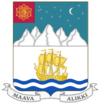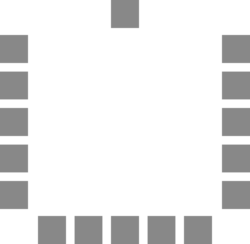National Congress of Mava: Difference between revisions
No edit summary |
|||
| Line 50: | Line 50: | ||
'''Mava Council''' ([[Mavean language|Mavean]]: ''Maava Taapiit''; "Council of Mava") is the unicameral legislature of the [[Atitlan|Atitlanese]] unincorporated territorial area of [[Mava]]. The Council was established in 1956 as an advisory body, serving alongside the Governor's Council until the latter's abolition in 1967. The council became the island's legislature in 1972 when the islands assumed self-government, with its powers expanding under the 2009 constitution. | '''Mava Council''' ([[Mavean language|Mavean]]: ''Maava Taapiit''; "Council of Mava") is the unicameral legislature of the [[Atitlan|Atitlanese]] unincorporated territorial area of [[Mava]]. The Council was established in 1956 as an advisory body, serving alongside the Governor's Council until the latter's abolition in 1967. The council became the island's legislature in 1972 when the islands assumed self-government, with its powers expanding under the 2009 constitution. | ||
The Mava Council consists of sixteen elected members, plus a number of non-voting attendants appointed by the Chairman with the council's approval. Attendants do not have speaking or voting rights and sit as observers. The Leader of the Council is elected to lead a cabinet of councillors that functions as the executive branch. | The Mava Council consists of sixteen elected members, plus a number of non-voting attendants appointed by the Chairman with the council's approval. Attendants do not have speaking or voting rights and sit as observers. The [[Leader of Mava Council|Leader of the Council]] is elected to lead a cabinet of councillors that functions as the executive branch. | ||
==History== | ==History== | ||
Revision as of 12:51, 27 July 2023
Mava Council Maava Taapiit | |
|---|---|
 | |
 Mava Council logo | |
| Type | |
| Type | |
| Leadership | |
Administrator of Mava | Asamak Umaakasarmuk since 19 August 2021 |
Chairman of the Council | Taarjut Niunak since 22 May 2023 |
Leader of the Council | Kausaanek Malaati since 22 March 2023 |
| Structure | |
| Seats | 16 |
 | |
Political groups | Nonpartisan: 16 seats
|
| Elections | |
| Block voting | |
Last election | 11 May 2023 |
Next election | before 8 May 2025 |
| Meeting place | |
| Maavaakitat, Paas, Mava | |
| Website | |
 |
|---|
| This article is part of a series on the politics and government of Mava |
|
Mava Council (Mavean: Maava Taapiit; "Council of Mava") is the unicameral legislature of the Atitlanese unincorporated territorial area of Mava. The Council was established in 1956 as an advisory body, serving alongside the Governor's Council until the latter's abolition in 1967. The council became the island's legislature in 1972 when the islands assumed self-government, with its powers expanding under the 2009 constitution.
The Mava Council consists of sixteen elected members, plus a number of non-voting attendants appointed by the Chairman with the council's approval. Attendants do not have speaking or voting rights and sit as observers. The Leader of the Council is elected to lead a cabinet of councillors that functions as the executive branch.
History
The Mava Council was established in 1956 as an advisory body without legislative competence. It was created at the instigation of the governor, Francisco Jose Valladares, in order to alleviate anger at the continued exclusion of native Maveans. The body was initially appointed by the governor, with responsibility for reviewing and offering an official opinion on laws approved in the Governor's Council (the de facto legislature). In 1967, with the abolition of the Governor's Council, the Mava Council assumed the responsibilities of reviewing legislation, although it did not have the authority of veto. At the same time, it became an elected body.
In 1972, the Mava Statute gave the islands self-government. As a result, the Council became the territory's unicameral parliament with full legislative competence in a range of policy areas. At the same time, the Council assumed the authority of electing a Leader to serve as the island's head of government, and of approving a cabinet to coordinate government policy.
Electoral system
The sixteen seats in the Mava Council are elected every four years, with eight seats elected at a given time. Councillors are elected by first-past-the-post plurality-at-large voting, with voters allowed to cast as many votes as there are available seats. The candidates with the most votes are elected to fill the vacant seats. Should a seat become vacant between elections, the seat goes to the candidate with the next largest vote share.
If there are fewer candidates than there are available seats, they are declared to have been elected automatically. The unfilled seats remain vacant until a sufficient number of candidates have declared their intention to fill them. At this point, a by-election is held to fill those seats.
Powers and functions
The council derives its powers principally from the Mava Statute of 1972 and the Mava Constitution Act 2009. It as 'general power of competence' over all policy areas under the authority of the local government, i.e. it is permitted to act in any matter whatsoever which does not conflict with or undermine the actions or interests of the Atitlanese government. The main responsibilitiy of the council is to provide for "the peace, order and good government of the Mava Islands," and to enact laws for the achievement of this.
All bills must be proposed for debate in the Council, although no councillor may propose a bill altering the powers of the Atitlanese government without the Governor's leave. As part of the council's consensus-based decision making, bills are generally debated to achieve consensus, with amendments seeking broad agreement amongst all councillors. The chairman, who normally does not participate in law making, may cast a vote in the event of a tie.
The council has the power to pass two types of legislation: ordinances and regulations. Ordinances are the equivalent of legislative acts and constitute the majority of legislation passed in the council. Under the Mava Constitution Act, council ordinances are recognised as having the same authority as federal acts in matters delegated to the local government. Ordinances are officially referred to in law as an "Ordinance under Section 31 of the Mava Constitution Act 2009" or a "Section 31 Ordinance." Regulations govern the procedures and rules of government bodies (including the council) and have little relevance to the public aside from in their interactions with these bodies.
Councillors are also responsible for the election of the Mava Council Cabinet, which serves as the executive branch of the government. The cabinet is officially a committee of the council and answerable to it. It has the sole authority to request the Governor (or Administrator) to appoint or dismiss a member of the cabinet, usually done at the request of the Leader of the Council as chairman of the cabinet.
Committees
The Council has three committees responsible for 'matters of general concern', i.e. matters not covered by a cabinet portfolio but is nonetheless under the authority of the Council. These are:
- Committee on the Application of Law - makes recommendations on whether applicable Atitlanese laws should be extended to Mava.
- Committee on Privileges - investigates concerns relating to the privileges and benefits extended to councillors.
- Committee on Administration - reviews rules relating to the administration of the Council.
Oath of office
Councillors, on their election, are required to make the following oath or affirmation.
I, [Name], having been elected to the Council, declare that I take that office upon myself, and will duly and faithflly fulfill the duties of it according to the best of my judgement and ability, and according to law.
Failure to do so prevents them from taking their seats and receiving a salary, and are automatically declared "un-elected" sixty days from the first meeting of the Council.
See also
- Politics of Mava
- Culture of Mava
Notes
External links
- Mava Council. maava.mv/an/council